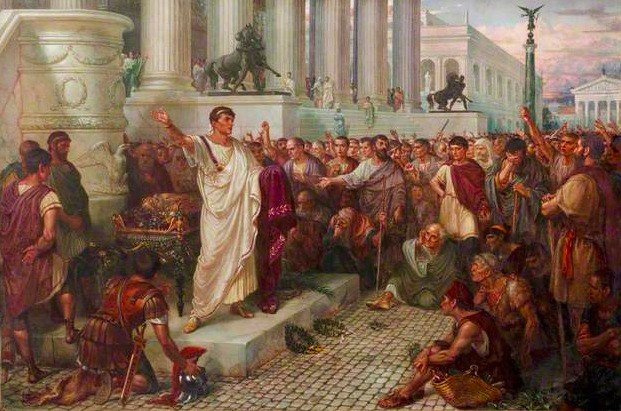Julius Caesar: Early Life‘Julius Caesar’, Act III, Scene 2, Marc Antony’s Oration&
Julius Caesar: Early Life‘Julius Caesar’, Act III, Scene 2, Marc Antony’s Oration by William Holmes SullivanGaius Julius Caesar was born 12 July 100 BCE (though somecite 102 as his birth year). His father, also Gaius Julius Caesar, was aPraetor who governed the province of Asia and his mother, Aurelia Cotta, was ofnoble birth. Both held to the Populare ideology of Rome which favoreddemocratization of government and more rights for the lower class as opposed tothe Optimate factions’ claim of the superiority of the nobility and traditionalRoman values which favored the upper classes. It should be understood that theOptimate and the Populare were not political parties in conflict with each otherbut, rather, political ideologies which many people shifted toward and from,regardless of class in society. The concept of appealing to the people forsupport, rather than seeking approval from the Roman Senate or the otherPatricians, would work well for Caesar later in life.YOUTH & MILITARY SERVICEWhen he wassixteen, his father died and Caesar became the head of the family. Decidingthat belonging to the priesthood would bring the most benefit to the family, hemanaged to have himself nominated as the new High Priest of Jupiter. As apriest not only had to be of patrician stock, but married to a patrician,Caesar broke off his engagement to a plebian girl and married the patrician,Cornelia, daughter of a high profile and influential member of the Populares,Lucius Cinna. When the Roman ruler Sulla declared himself dictator, he began asystematic purge of his enemies and particularly of those who held to thePopulare ideology. Caesar was targeted and fled Rome but his sentencewas lifted through the intercession of his mother’s family. Still, he was stripped of his position aspriest and his wife’s dowry was confiscated. Left without means of supportinghimself or his family, Caesar joined the army.He proved himself an effective soldier, even being awardedthe civic crown for saving a life in battle, and was promoted to the staff ofthe military legate to Bithynia to secure a fleet of ships. In this, as in histime as a soldier, Caesar was successful and, when Sulla died, he decided toreturn to Rome and try his luck as an orator. In this,too, he proved a success and became well known as an eloquent speaker.In 75 BCE, while sailing to Greece, Caesar was kidnapped bypirates and held for ransom. In keeping with the high opinion he had ofhimself, it is said that when the pirates told him he would be ransomed fortwenty talents, Caesar claimed he was worth at least fifty. While he was heldcaptive by them, Caesar was treated well and consistently maintained a friendlyrelationship with the pirates. He is said to have repeatedly told them that,upon his release, he would hunt them down and have them crucified for theaffront to his family and personal dignity and this threat the piratesunderstood as a joke. Upon his release, however, Caesar made good on thatthreat. He had the pirates’ throats slit before crucifixion, however, in a showof leniency owing to their easy treatment of him in captivity. Thisdetermination of Caesar’s, to do exactly what he said he would do, became oneof his defining characteristics throughout his life. -- source link
Tumblr Blog : historyfilia.tumblr.com
#history#ancient history#rome#ancient rome#iulius caesar#caesar#biography
